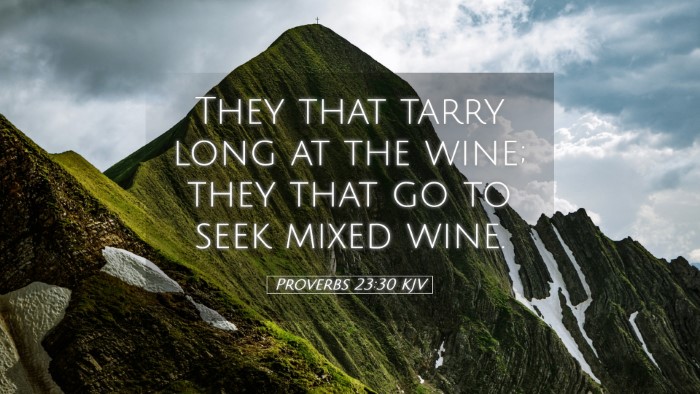Commentary on Proverbs 23:30
Verse Context: Proverbs 23:30 states, "They that tarry long at the wine; they that go to seek mixed wine." This verse serves as a warning against the dangers of excessive drinking and the temptations associated with alcohol.
Introduction
This verse encapsulates a critical admonition concerning alcohol consumption, particularly its overindulgence. The wisdom found in Proverbs often addresses the conduct befitting the wise versus the foolish, and this verse contributes to that overarching theme by illustrating the consequences of indulgent behavior. Several public domain commentaries provide deeper insights into this verse, which will be explored in detail.
Insights from Matthew Henry
Matthew Henry, in his renowned commentary, emphasizes the moral implications of this verse. He indicates that:
- Indulgence Leads to Destruction: Henry explains that those who delay their consumption at the wine are likely losing sight of moderation. The idea of "tarrying long" hints at a lack of self-control, which ultimately can lead to broader spiritual decay.
- Mixed Wine Represents Temptation: The phrase "mixed wine" suggests a combination of various intoxicants. Henry instructs the reader to recognize that seeking out other forms of temptation can lead to moral compromise. He encourages believers to resist the allure of worldly pleasures.
Albert Barnes' Perspective
Albert Barnes offers a more practical approach in his commentary, noting:
- Dangers of Prolonged Drinking: Barnes elaborates on the psychological aspects of this verse, explaining how prolonging the consumption of wine can dull the senses, impair judgment, and lead to grievous consequences. He cites historical references to caution against the behaviors seen in those partaking in excessive drinking.
- Social and Personal Outcomes: He indicates that a person who frequently seeks mixed wine often finds themselves embroiled in conflicts and moral dilemmas. Barnes encourages a lifestyle rooted in discipline, especially for leaders and those in positions of influence.
Adam Clarke’s Interpretation
Adam Clarke provides additional theological insights, highlighting the significance of wisdom in contrast to folly:
- Nature of Wine as a Symbol: Clarke notes that wine in the Scriptures often symbolizes both delight and disaster. He elucidates the dual nature of physical pleasure against spiritual awakening, advocating for a balanced approach to life’s pleasures.
- Warnings Against Compromise: Clarke also suggests that seeking mixed wine reflects a compromising spirit, which grieves the Holy Spirit. He urges believers to recognize their responses to temptation and the need for vigilance in all aspects of life.
Theological Implications
This passage raises significant theological reflections on the nature of temptation, self-control, and spiritual integrity:
- Self-Control: The call for self-restraint resonates throughout Christian teachings. Followers of Christ are urged to practice discipline, especially in areas where the flesh may lead to moral decay.
- The Role of Community: Excessive drinking often leads to relational breakdowns. This verse reminds believers to be mindful of their actions and their impacts on the community.
- Holistic Approach to Life: The wisdom literature encourages an embrace of balanced living, where the pleasures of life do not overshadow one’s spiritual calling and responsibilities.
Practical Applications for Believers
The reflections derived from Proverbs 23:30 can be practically applied in several areas:
- Discernment in Choices: Believers should exercise discernment in their lifestyle choices, particularly regarding substances that can impair their judgment.
- Education on Alcohol: The church community can benefit from educating its members on the effects of alcohol, emphasizing the importance of moderation and self-control.
- Support Systems: Developing support systems for those struggling with alcohol can be a proactive approach to addressing potential issues before they escalate.
- Modeling Behavior: Leaders and mentors within the church are called to model healthy habits that encourage others to lead a life of wisdom and moderation.
Conclusion
In summary, Proverbs 23:30 serves as a powerful reminder of the perils of excess and the importance of wise living. The insights gleaned from Matthew Henry, Albert Barnes, and Adam Clarke collectively encourage believers to pursue a life of balance and vigilance, honoring their bodies and spirits while navigating the challenges of modern life. As pastors, students, and scholars delve into this verse, the call remains clear: to embody wisdom and avoid the snares of indulgence.


